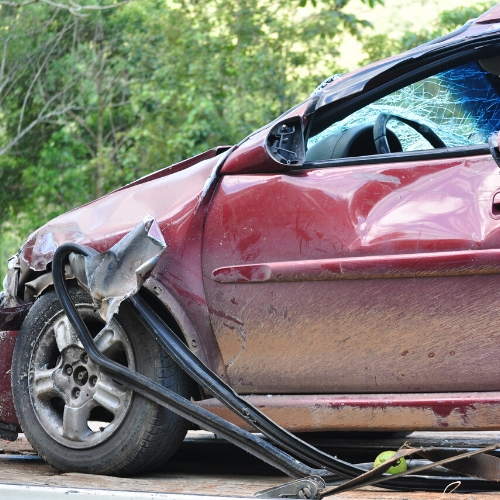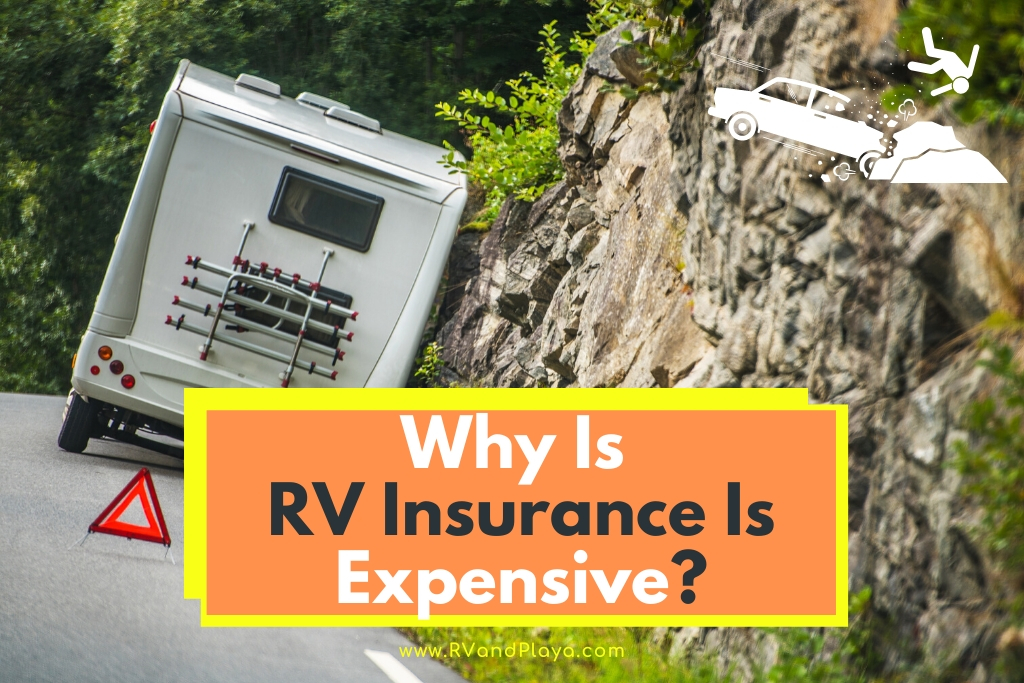In every state, RV insurance is required. Protecting your camper or RV is just as important as protecting your home or car; after all, it is your home-on-wheels. Let’s take a look at some of the factors that determine the costs of RV insurance.
Why is RV insurance is so expensive? It is costly because of a few factors, such as:
- The minimum coverage for the state where you buy insurance
- The size and type the RV you own
- The kind of coverage you want
- The provider of your RV insurance
The thrill of going RVing over a long weekend is a feeling that many of us look forward to when we have time to adventure.
Learning which factors influence RV insurance quotes and how you can protect the maximum comfort and mobility of your motorhome or camper will bring additional peace of mind to your trips!
Table of Contents
Is RV Insurance More Expensive Than Car Insurance?
Is RV insurance more expensive than car Insurance? Yes, RV insurance can be more expensive than car insurance, but the costs of both are within a range of $1,000-$5,500 annually, depending on several factors.

Michigan has some of the highest auto and RV insurance rates in the country, and Michiganders pay a median of approximately $4,500. Car insurance averages $2,800 in Michigan, so it is more expensive, on average, to insure an RV than a car in Michigan.
The Great Lakes State certainly likes to go RVing.
Below you can find the Average RV Insurance Rates Across 6 States:
| States | Insurance rates per year (USD) |
|---|---|
| North Carolina | $875 |
| Oregon | $895 |
| Massachusetts | $1,135 |
| Michigan | $4,485 |
| California | $4,085 |
| Texas | $1,435 |
It is important to remember that many factors can go into both car insurance and RV insurance quotes, and the kinds of coverage and the type of RV you are covering will ultimately determine the price of your insurance quote.
RV insurance requirements are different from car insurance requirements in each state, and the cost of your insurance will be influenced heavily by the minimum requirements of the state where your RV is insured. ds
Related reading: How Much is it to Buy Back a Totaled RV From Insurance?
1. State Minimum Requirements for RV Insurance
Every state requires RV owners to have insurance on their RVs to protect both the RV owner and anyone else who uses or comes into contact with the RV.
The cost of your RV insurance will depend largely on the amount of coverage you are required to have in your state.
Some states where RV use is higher or more accidents are likely to occur have higher insurance costs than less active states.
All states require RV owners to carry bodily injury liability insurance for both individuals and accidents to protect RV’s and owners while traveling or relaxing at a destination like the Great Lakes.
Most states also require property damage liability insurance to protect both the RV and any accidental property damage that might occur during transportation.
Some states also require uninsured motorist coverage to protect anyone who does not have insurance.
Other states require that you carry extensive personal injury protection insurance on for you RV.
2. Types of RV and How They Influence Insurance Costs
Whether you are the owner of a pop-up camper or a Class A motorhome, the type of RV you have will also influence the cost of your insurance.
Size Matters: You Pay for How Much You Are Insuring
Protecting the ease and comfort of large motorhomes costs more than protecting the coziness and simplicity of a travel trailer.
- Larger motorhomes come with all sorts of accouterments to make your journey comfortable, from slide-out sections to expand living space to amenities like laundry machines and full kitchens, and it costs more to ensure more all the bells and whistles.
- Pop-up campers, teardrop or tiny campers, and travel trailers, the smaller classes of RVs, will be less expensive to cover. Because you are using an additional vehicle to transport the camper, the unit is less complex and will require less coverage.

- The medium class of campers, including toy haulers, fifth-wheel campers, and larger trailers, will cost a bit more to insure than those in smaller classes. These often have some of the advanced features of motorhomes but without all the bulk. It does still require an additional vehicle to pull these types of campers, so the insurance costs for these will be lower as well.
Class B and C
The smaller classes of motorhomes, those that fall into classes B and C and are typically quite small, simple homes, will not have the advanced features of the larger campers but also don’t require another vehicle to transport.
The motorhome will be more expensive to insure because of the increased complexity of the vehicle.
Expect prices for smaller motorhomes to be on par with the larger classes of campers.
Class A
Large, comfortable, and elegant, class A gas or diesel motorhomes will be the most expensive type to insure.
These are big, sophisticated works of engineering and technology, and there is a lot to protect.
Owners will often take out more insurance on a class A motorhome in order to protect not only themselves but also all of the property they travel around with, which can raise the cost of insuring a class A motorhome.
3. Types of RV Insurance Coverage
That brings us to the different kinds of coverage that are available to RV owners. Personal effects coverage, as described in the above paragraph, covers any item you bring into the RV to use it as a temporary residence.
Additional coverage like personal effects coverage you need or desire will increase the cost of your RV insurance.
Personal Effects Coverage
There are some additional coverages that are really useful, like personal effects coverage. You will want to protect your property, especially if you are traveling across the country in an elegant class A motorhome.
There are different types of personal effects coverage that cover secured belongings, like a washer and dryer or other appliances.
There are also scheduled personal effects coverages available if you want to insure anything costly that you store in the RV, like jewelry or technology.
Full-Time vs. Part-Time or Vacation Liability
You will probably also want full-time coverage in that case, rather than part-time or vacation liability.
Full-time liability will ensure that you and your belongings are protected at all times, not just when your RV is in a campsite or when you are using it on vacation.
Full-time liability can provide peace of mind for you and your RV, but vacation liability will help you to save on your insurance costs.
Other additional coverages might include roadside or emergence coverage.
Your insurance provider might provide a service that can help you to get into an emergency and are unable to use your RV, or if you need it to be towed or have a tire changed by the side of a busy highway.
Related reading: Renting an RV to Live In: Everything You Need to Know
4. RV Insurance Providers
Insurance providers will offer different rates for all of the coverages and services listed above.
It will be important for you to research and find which providers offer the kinds of coverage that are required by your state, and one that offers the coverage you want and need.
It will be worthwhile to research providers to ensure that you are buying the best possible protection for your motorhome or camper.
One way to save on your RV insurance is by bundling your insurance services; contact the provider of your home, auto, or life insurance and asking them if they provide RV insurance as well.
Bundling your services can ensure that you get the best rates possible and keeps the hassle of dealing with several insurance providers to a minimum.
In the following table you will find the best rated RV insurance providers I have found on the market at the moment (customer services, ratings, coverage options, discounts, financial strength):
| RV Insurance Agency | Coverage Options |
|---|---|
| Good Sam (Top Choice!) | . 96% overall customer satisfaction rating . Customers report average savings of $321 per year . Total-loss replacement for motorhomes and travel trailers . Specialized coverage for full timers or first-time weekend RV’ers . RV storage option allows you to save even more by turning off coverage when your RV is not in use! |
| RVInsurance.com | . Customers report average savings of $321 per year . Covers everything from class A motorhomes to pop-up campers . Quote and buy online . Speak to a professional, licensed agent . Fully licensed, multi-line agency can quote your auto, home, boat and other insurance products |
| National General | . Top rated C=choice: A+ BBB rating . “Turn Off” for liability & collision during storage – Save 53% . Cover your personal belongings or attachments . Full-timer coverage options . Mexico insurance options . Total Loss RV replacement . 24-hour claims support |
| Progressive | . Progressive Insurance – Trusted by Over 18,000,000 . Competitive rates, tons of discounts (safe driver, pay-in-full, multi-car, multi-policy, quoting online & more) . Name your price Tool® . Comprehensive List of RV Covered Items . Roadside Assistance Included . Recreational Vehicles, Trailers & Fifth Wheels |
Read Next
Average RV Park Rates: Actual Campgrounds Prices per Night
How to Prevent Travel Trailer Theft – 13 Steps that Work
Can You Rent an RV One Way? 24 Insider Tips
Can You Rent an RV If You’re Under 25? [Read This Before]
Recent Posts
Is Toyota Remote Connect Free? (Subscription, Services Plans)
Does Toyota Remote Connect have an included trial? It used to be the case that, when you bought a new car, you made one straightforward payment and that was it. Now, it feels like there are...
Toyota Safety Connect: What It Is And Why You Need It? Whether you’re buying a new Toyota or you’ve had one for a while you will have been given the hard sell on their Connected Services but do...

